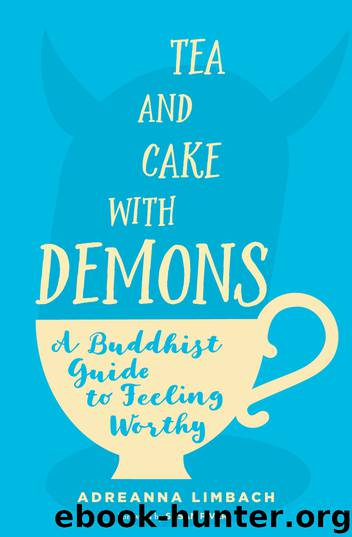Tea and Cake with Demons by Adreanna Limbach

Author:Adreanna Limbach
Language: eng
Format: epub, mobi
Publisher: Sounds True
10
What’s the Story, Morning Glory?
Beneficial View
But if you really learn how to pay attention, then you will know there are other options. It will actually be within your power to experience a crowded, hot, slow, consumer-hell type situation as not only meaningful, but sacred, on fire with the same force that made the stars: love, fellowship, the mystical oneness of all things deep down.
David Foster Wallace, This Is Water
If I were to ask you to tell me a story about yourself, what would you say?
Maybe you have a few personal favorites on deck. Perhaps there’s the story of the place where you grew up, your childhood home or the lack thereof, and how that reality shaped you. Perhaps you would share family mythology and yarns of experiential ephemera that helped to shed light on your character—the ones about the smell of gasoline on your dad’s overalls after work, kicking up mounds of leaves to forage for wild mushrooms in the spring, the feral spirit of your great-grandmother, whom you never met but family lore has it toured America in a Western band. There are coming-of-age tales of getting dumped by friends and kissed by crushes. Or that crazy time you took a road trip to who knows where to do who knows what, and you returned home with a better understanding of yourself. Perhaps you would look at me blankly and shrug, suggesting that you don’t have any stories worth telling. You don’t fancy yourself a storyteller, per se. How many of us do, after all? Storytelling has been branded by many as a skill reserved for only comedians, novelists, and playwrights.
However, if I asked you how your day went, you would most likely tell me a story as a matter of course. Very few of us can help it. Stories are birthed to us by human design and reflect the wiring of our minds—right down to the way that we catalog our experiences in chronological order and then recall them in narrative arcs. We’ve maintained centuries of cultural identity and traditional practices by preserving them in neatly spun time capsules of mythology, fable, and folklore. This is who we are as a people. This is what it means to be human. As the writer Joan Didion once famously noted, “We tell ourselves stories in order to live.”1 We’re swimming in stories, both societal and personal, and we’re all living under the influence of our storytelling minds.
As we make our initial foray onto the Eightfold Path, the first thing that’s being asked of us is to take a lovingly honest look at the stories that we tell ourselves, where they originated, and what we believe they mean. In Sanskrit, this opening aspect of the Eightfold Path is called samma ditthi, which can be translated as Wise or Beneficial View. Although the Eightfold Path itself is not linear, the location of Beneficial View as our entry point speaks volumes to its importance. Our point of view, or perspective, is as unique
Download
This site does not store any files on its server. We only index and link to content provided by other sites. Please contact the content providers to delete copyright contents if any and email us, we'll remove relevant links or contents immediately.
The Way of Zen by Alan W. Watts(6614)
Ego Is the Enemy by Ryan Holiday(5450)
The Art of Happiness by The Dalai Lama(4130)
The Book of Joy by Dalai Lama(3986)
Why Buddhism is True by Robert Wright(3454)
Spark Joy by Marie Kondo(3304)
Shift into Freedom by Loch Kelly(3199)
Happiness by Matthieu Ricard(3050)
A Monk's Guide to a Clean House and Mind by Shoukei Matsumoto(2915)
The Lost Art of Good Conversation by Sakyong Mipham(2654)
The Meaning of the Library by unknow(2573)
The Unfettered Mind: Writings from a Zen Master to a Master Swordsman by Takuan Soho(2311)
The Third Eye by T. Lobsang Rampa(2269)
Anthology by T J(2215)
Red Shambhala by Andrei Znamenski(2200)
The Diamond Cutter by Geshe Michael Roach(2062)
Thoughts Without A Thinker: Psychotherapy from a Buddhist Perspective by Epstein Mark(2028)
Twilight of Idols and Anti-Christ by Friedrich Nietzsche(1894)
Advice Not Given by Mark Epstein(1881)
